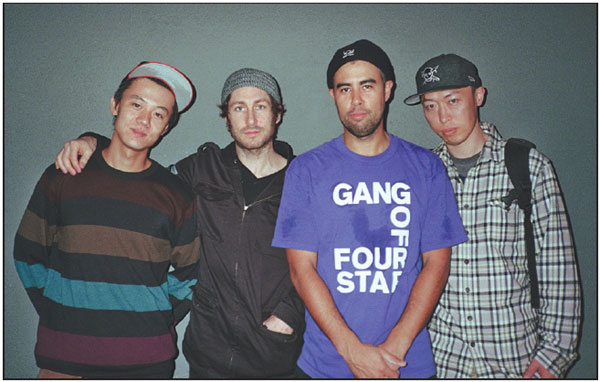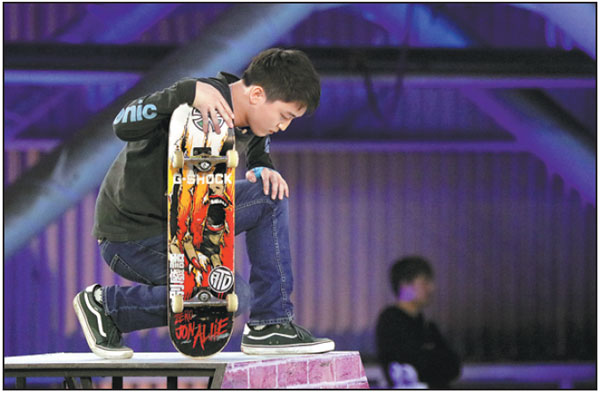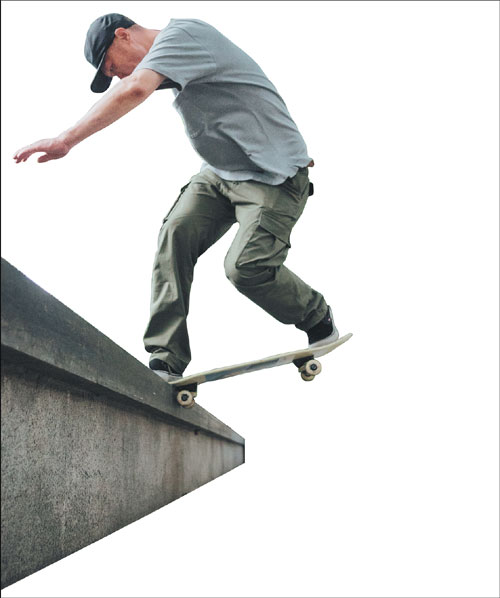Directors of the board
Skateboarding is thriving now, but it's taken the hard work of dedicated and bruised practitioners to build up momentum, Xing Wen reports.
A low rumble, punctuated by the rhythmic "click, click, click" caused by the grouting between paving slabs. A scrape, a sharp "CLACK", silence, and a clatter, followed by the return of that monotonous rumble ... It's a soundtrack heard on nearly every street in almost every corner of the world.
It is the music of defiance and rebellion, of freedom and youth. It's a song that parents hate and that evokes dollar signs in the minds of osteopathic doctors.
Yet, in Tokyo next year, it will be one of the loudest played pieces in the concerto of the Summer Olympics. Skateboarding has finally arrived on the biggest stage in the world - and China is looking for a front-row seat.
|
Chinese veteran skateboarders Che Lin (left) and Han Minjie (right) with owners of the Berrics, a private indoor skatepark, when they first visited the Los Angeles-based facility around a decade ago. |
|
Liu Jiaming, 23, a promising skateboarder prepares to "drop in" to a 3-meter jump in a recent reality show, One More Try. |
These days, young people skateboarding wherever the street furniture forms ramps, bumps, rails and ledges may be common - along with hearing slang terms like "lock in" and "drop in" - but, the development of skating culture in China is a 30-year story.
If you ask the first generation of Chinese skateboarders what opened the door to this refreshing and thrilling action sport, the most likely answer would be the 1989 American movie, Gleaming the Cube.
It wasn't the film's slightly silly plot that captured the imaginations of those wide-eyed Chinese teenagers, though - it was actor Christian Slater's various fluid maneuvers and high-flying stunts with a skateboard. The movie developed a cult following, leaving many of the youngsters agog. Han Minjie, 44, a Shanghai native who joined the trend in the early 1990s, is no exception.
"I watched the movie in 1992 and found that this super cool sport had a strong appeal to me," recalls Han.
Soon afterward, he bought himself a toy board, which is far less durable than a pro board, and used it to practice rolling and turning on the streets at midnight.
The 'drop in'
Desperate to know more about this exotic new sport, he asked friends who traveled abroad to bring back skateboarding magazines and recorded skateboard-related clips from films, TV programs and even cartoons.
Learning tricks with no professional instruction and the limited materials was tough. Pop the board up into the air, jump, drag the front foot forward to catch the board and then push it down by straightening legs out - by practicing again and again, he finally managed to combine these motions and conquer the "ollie", a basic maneuver that helps to land many other, more complicated, tricks.
"Unlike younger skateboarders who can get access to overwhelming information about the sport on the internet, I had to spare no effort in collecting information and I would wrack my brain to remember tips for carrying out tricky maneuvers," he says. "It was difficult, but joyful."
Han had been learning and practicing on his own until one day, he came across a fellow skater at a street corner who could perform jumps.
"At that moment, I was so happy knowing that someone in the city shared the same passion with me. It must have been fate," he says. "We practiced together and became good pals."
Later on, the skateboarding duo was exposed to a bigger clique thanks to a postage-stamp-sized advertisement in a newspaper. Other skaters were inviting people to meet at People's Park at a certain time. Han was a regular visitor to the spot, becoming part of a thriving group of local board riders.
In 1994, the Shanghai native's skateboarding circle grew to encompass peers across the nation after traveling to Hebei province's Qinhuangdao to attend a domestic skateboarding contest sponsored by the American company Powell Peralta - the first skateboard brand to set up in China in 1990.
The company ran a retail store in Qinhuangdao selling imported pro boards and high-quality parts like decks, trucks and wheels, meanwhile distributing monthly mimeographed fliers to its customers to share the latest skateboarding news.
"That's how I found out about the skateboarding contest," recalls Han. "I was really surprised and excited to see skateboarders from across the country show up at the event."
After the unprecedented gathering, the first generation of Chinese skaters began to explore ways to promote the culture across the country, including opening local skateboard stores, filming videos and setting up online communities and media events to share news related to the sport.
Han, then a salesman at a leading dairy producer, decided to quit his stable job and start a skateboarding business. In 1999 he opened Shanghai's first skate shop selling boards and accessories, including sneakers, clothing and other gear. Three years later, he launched his own skateboarding brand.
Then, around the turn of the century, major skateboarding companies also began to arrive in China, one after another, by cooperating with skateboarding shops, sponsoring skaters and organizing standardized contests.
The 'lock in'
Han emphasizes the significance of skate shops in promoting the sport, as they strengthen the connection among skaters and bring ordinary people closer to the culture.
Lacking professional instruction himself, he was willing to help young beginners by lending out DVDs or offering free training courses.
Wang Minjun, 28, was among the beneficiaries of Han's devotion.
After Wang, who picked up the board at 12, grew into a well-performing skater, Han started to sponsor him. "As a student who couldn't afford quality boards and shoes, I was delighted to get Han's support," says Wang. "From then on, I started to throw myself into the sport."
Wang says that, despite not many people sharing the same interest with him at the time, he could feel the strong bond within the skating community, which formed via the various skating spots scattered around the city.
"I used to go skateboarding at Shanghai Concert Hall with my pals. There are marble tiles on the ground, ledges, stairs and walls. It's our own 'love park'," he says, referring to Love Park (officially known as John F.Kennedy Plaza) in Philadelphia, a former hot spot for US skaters.
He adds that skating has also improved his personality. "I was a bit aloof and arrogant, but now I have become more polite, warmhearted and more willing to make friends," says Wang. "I feel that all skaters are my 'homies', which is part of the skating spirit."
Liu Jiaming, 23, a Shenzhen-based skater, agrees. "I think it allows me to stay different from my schoolmates," he adds. "I hope I can maintain my uniqueness."
The young daredevil fell in love with skateboarding when he was 11, mainly because he appreciated the boldness of skaters and enjoyed the strong sense of fulfillment after mastering a new trick. In 2011, at 15, he became the youngest professional skateboarder in China after he won his first championship - the semiprofessional section of the Nike City Jam Series.
"Never yield to a challenge is something I've learned from skateboarding," says Liu.
He also takes the same attitude when encountering difficulties in other fields. In 2013, when he first met his idol, US skater Chris Cole, he struggled with his English. However, when they met a second time, he was fluent thanks to a year of intensive studying.
The 'extension'
As skateboarding will make its Olympic debut at the Tokyo 2020 Games, Liu was selected for the national skateboarding team.
The formerly carefree and unruly young man who once told the South China Morning Post "I don't like being told what to do", has become more self-disciplined and fueled by his sense of honor and responsibility.
Recalling the moment when he won a bronze medal - his first for his country - in the "street" section of the skateboard competition at the 2014 Asian Beach Games in Phuket, Thailand, Liu says: "I never expected that I would be so proud of my motherland."
The elevation of skateboarding to one of the world's leading international sporting events has not only encouraged more people to try their hand at it, but has even spawned a mainstream reality TV sensation.
An online show, One More Try, sheds light on the lives of Chinese skaters. The first six episodes of the show, where participants skate on all types of terrain and perform combos of amazing tricks, have already notched up over 300 million views on Tencent's video platform, according to the box-office tracker Maoyan.
The rising profile of the sport has also stimulated the government, companies and social programs to get involved in building dedicated skate parks. However, Han points out that all parties need to cooperate on a design plan. "One that best fits the level of Chinese skaters, making full use of all the resources available, and opening them to the public," Han says. "Just giving a street sport, born from a subculture, such a significant platform is a positive signal. I'm going to embrace it."
Contact the writer at xingwen@chinadaily.com.cn
|
Han Minjie balances on his board on the street. |
|
Many young people in China now enjoy skateboarding. Photos Provided to China Daily |
(China Daily Global 07/31/2019 page14)






















